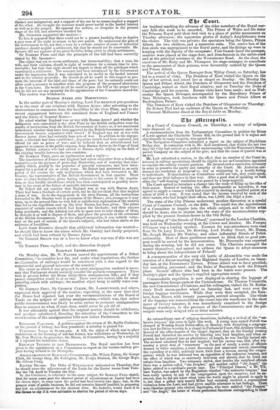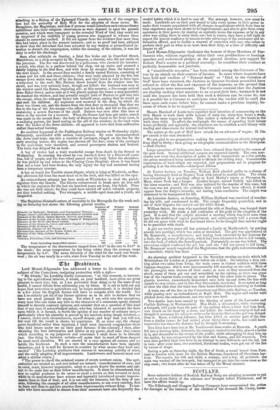Zbe iffittropolis.
At a Court of Common Council, on Thursday, a variety of subject% were disposed of.
A recommendation from the Parliamentary Committee to petition the House of Lords against the Charitable Trusts Bill, on the ground that it is unjust and objectionable in many respects, was agreed to. The Navigation Committee submitted a report on the subject of Blackfriars Bridge pier. In connexion with it, Mr. Hall mentioned, that within the last two days the City had arrived at a perfect understanding with the Watermen's Steam- packet Company on the subject of the pier; and that the cause of quarrel was at an end.
Mr. Lott submitted a motion, to the effect that no member of the Court in- terested in railway speculations should be eligible to act on Committees appointed to consider the railway termini question. He deemed such a restriction necessary in order to preserve the purity and integrity of the Court, Mr. Anderton con- demned the resolution as inoperative, and as originating in a hostile fee * to individuals. If shareholders on Committees could not vote, they could and thus use their influence in that way. After a good deal of speaking on both sides, the "self-denying" resolution was passed by a large majority.
The Court agreed to introduce a change into the mode of filling up the office of fruit-meter. Instead of making the office purchaseahle as heretofore, it was agreed to supply a vacancy which had occurred by electing a qualified person at a salary of 2501. a year. It was stated that the income received by each of the three meters, who had bought their offices, was 1,2881. 10s. mid. a year.
The state of the City Prisons underwent another discussion at a special Court of Common Council, on the 20th. The result was the appointment of a Committee to inquire into the whole subject, and to advise what should be done; also to inquire into the state of the accommodation sup- plied by the present Sessions-house in the Old Bailey.
A meeting of " the friends of Poland," convened by the London Chartists, was held on Wednesday evening, at the Crown and Anchor. Mr. Feargus O'Connor was a leading speaker. Excuses for non-attendance were read from Sir be Lacy Evans, Dr. Bowring, Lord Dudley. Stuart, Mr. Hume, Mr. Joseph Mazzini, Mr. Wakley, and other influential friends of Polish nationality. Most of these gentlemen seemed to think that no good pttr- pose would be served by the demonstration. Mr. Buncombe was expected during the evening, but he did not come. The Chartists managed the matter themselves; and agreed to address the Queen to adopt measures to bring about the independence of Poland!
A commemoration of the very old battle of. Alexandria was made the occasion of a dinner-meeting of the Highland Society of London, on Satur- day last, at the Freemason's Tavern. Prince Albert. was to have presided; but something prevented; and the Duke of Buccleuch took the Prince's place. Several officers who had been in the battle were present. The Society's piper and the Queen's supplied appropriate music.
Commendable expedition is now displayed in clearing the luggage of passengers from foreign parts at the Customhouse. Sir Thomas Fremantle, the new Commissioner of Customs, and his colleagues, visited the St. Katha- rine's Dock steam-packet wharf on Saturday last, and went over the foreign baggage warehouses. While they were thus occupied, the Rain- bow, from Havre, with twenty passengers, arrived alongside. The whole of the baggage was removed from the vessel into the warehouse in the short space of twenty minutes; it was immediately examined in the foreign baggage warehouse, in the presence of the Commissioners; and the pas- sengers were only delayed two or three minutes.
An extraordinary case of religious fanaticism, including a revival of the "un- known tongues," has come to light this week. A young man named Powell was charged at Worship Street Police-office, on Monday, with disturbing a in congrega-
tion met for Divine worship in a chapel n Parliament Court, Old Artillery Ground. Several of the office-bearers of the chapel deposed, that on the Sunday evening Powell had disturbed the service by bursting into loud laughter, and when re- proved, he had entered into an altercation; at length, he was forcibly turned out. The accused admitted that be had laughed; butlis excuse was, that after wit- nessing a great deal of "mummery " on the part of nearly a score of officials dressed in white surplices, a most discordant and unnatural outcry, resembling the squealing of a child, suddenly burst forth from a woman among the congre- gation; which he was informed was an exposition of the unknown tongues, and the effect of which was so extremely ludicrous and absurd, that he could not refrain from laughter. Two witnesses stated, that besides the surpliced officials there was a person called " the Prophet," and another called " the Angel," the latter attired in a cardinal's purple cape. The " Principal Deacon," a Mr. Wil- liam Taylor, was saked by the Magistrate whether " the unknown tongues " had been really spoken by any of the congregation upon the occasicn; and he an- swered, that he did not know what term the world might be pleased to apply to it, but that a gifted lady named Miller had certainly received a supernatural visitation from the Lord, and had given audible utterance to her feelings. There were likewise present two clerical dignitaries, who were entitled "the Prophet" and "the Angel," the latter of whom performed functions corresponding to those attaching to a Bishop. of the Episcopal Church: the members of the congrega- tion had the authority of Holy Writ for the adoption of those terms. Mr. Broughton, the Magistrate, said that if persons would introduce such extraordinary exhibitions into their religious observances as were deposed to upon the present occasion, and which were repugnant to the revealed Word of God, they could not be surprised if the risibility of young persons who happened to witness them should be somewhat excited. It did not appear from the evidence that more than this had taken place in the present instance; and as no proof had been adduced to show that the defendant had been actuated by any wanton or premeditated in- tention to disturb the congregation, within the meaning of the statute, it was his duty to order his discharge.
Soon after midnight on Sunday, a fatal fire broke out in Crawford Street, Marylebone, in a shop occupied by Mr. Teinpson, a chemist, who did not reside on the premises. The fire was discovered by a policeman, who alarmed the inmates: a youth, who slept in a parlour behind the shop, ran up stairs and aroused a family lodging in the first floor, and with them he escaped from the balcony to
the next house. In the second resided a family named Batters, consisting of a man and his wife and three children: they were early alarmed by the fire, but escape down stairs was cut off by the flames, and they tried in vain to force open a trap-door in the roof: Mrs. Batters threw herself from the window into the street, and was vary seriously. hurt, though not killed: the husband was seen at the window amid the flames, imploring aid: at this moment, a fire-escape arrived from Baker Street, and as soon as it was placed against the house a man ascended; he reached the window, and had actually caught hold of Butters to pull him into the escape, when the unhappy father tore himself away, saying that he would go
i
and seek his children. An explosion now occurred in the shop, by which the front was blown out, and the flames from the first floor so increased that they set
fire to the top of the fire-escape—the officer lost his hold, and fell to the ground, sustaining a severe fracture of the skull. Butters was seen after this once or twice at the window for a moment. When the flames had been got under, search
was made in the second floor: the body of Butters was found in the front room, in a reclining posture, his hand resting on the sill of the window; in the back room were "the bodiesof the three children: all appeared to have died from suffocation rather than actual burning.
An accident happened at the Paddington Railway station on Wednesday night; fortunately, unattended with serious consequences. By some mismanagement
the down mail-train ran into a number of carriages, ranged on the line for the early morning trains; the engine was thrown off the line; some of the carriages in the mail-train were shattered, and several passengers shaken and bruised. The train was delayed for an hour.
A boy of twelve had a truly wonderful escape from death in the Strand on Wednesday. In crossing the street he was knocked down by a Blackwell omni- bus, full of people, and the fore-wheel passed over his body below the shoulders: he was picked up and taken to the Charing Cross Hospital; where it was found that not a bone had been broken, the only injury the boy had sustained having been a temporary syncope.
A boy on board the Terrible steam-frigate, which is lying at Woolwich, on Sun- day afternoon fell from the mast-head on to the deck, and was killed on the spot.
An extraordinary attempt has been made at Wimbledon to steal the parish- registers from the church. The thieves endeavoured to break open an iron safe in which the registers for the last six hundred years are kept, but failed. Plun- der was not their object; for they could have carried off much valuable property, yet they touched nothing. Two strangers, a middle-aged man and a youth, are suspected.
The Registrar-General's return of mortality in the Metropolis for the week end- ibg on Saturday last shows the following general results.
Number of Winter Annual deaths. average. average.
ZiErrZstfIceitr.:&itniiiocehEndemic, d erg uncertain or Diseases i,;ii
140 ... 103 ... IN
Diseases of the Brain. Spinal Marrow, Nerves, and Senses 160 169 ... 157 Diseases of the Lungs, and of the other Organs of Respiration 279 363 ... 294 Diseases of the Heart and Blood-vessels 28 30 ... 27 Diseases of the Stomach, Liver, and other Organs of Digestion 63 G9 ... 72 Diseases of the Kidneys, &c 10
Childbirth, disease, of the lJterus, &c 15 12 ... 10 Rheumatism, diseases of the Bones, joints, &c 8
Diseases of the SAM, Cellular Tissue, &c. 4
Old Age 53
90 ... 67 Violence, Drivation, Cold, and Intemperance 43 27 ... 26 Total (including =specified causes) 880 ... 1,080 ... 968
The temperature of the thermometer ranged from 59.6° in the sun to 24.0° in the shade; the mean temperature by day being colder than the average mean temperature by 4.4°. The mean direction of the wind for the week was South- west ; the air was nearly in a calm state from Tuesday to the end of the week.



























 Previous page
Previous page